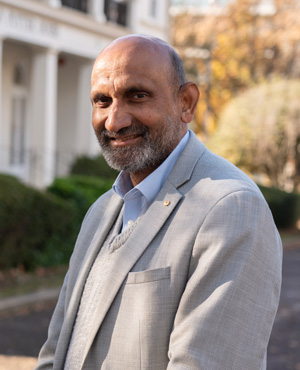
We pause this month to remember former President of the Academy and former Chief Scientist of Australia, Dr Jim Peacock AC FAA FTSE FRS, who passed at the age of 87. Jim made outstanding contributions to Australian science, agriculture and science education over many years, and was dedicated to the Academy. He will be deeply missed and I offer my sincerest condolences to Dr Peacock's family and friends.
As I write this month’s message, the Academy is eagerly awaiting the final report from the Strategic Examination of R&D (SERD), which will be delivered to the federal Government any week now.
The Academy’s response to the SERD issues papers welcomed proposals in support of investment in next-generation high-performance computing and data to enhance Australia's digital innovation and AI capabilities. We have advocated for this national capability over several years and we strongly welcome its inclusion in the SERD issues papers.
However, the Academy is deeply concerned that the issues papers have failed to address declining investment in fundamental research, instead implying research is only important if it can be commercialised by industry.
On a related note, the Academy continues to urgently call for a comprehensive, 10-year R&D investment plan supported by a temporary, budget-positive R&D levy. This investment could reverse the funding decline and create a globally competitive research ecosystem that drives economic growth. Critically, this would support exactly the kind of fundamental research from which industry, and society as a whole, so richly benefit.
We were recently served a powerful reminder of why investment in fundamental research matters with Professor Richard Robson FAA FRS announced as one of three scientists to win the 2025 Nobel Prize in Chemistry. His career was supported by patient, sustained funding from the Australian Research Council. We congratulate Professor Robson and his colleagues on this remarkable achievement.
But how many future potential Nobel Laureates are we failing to support because of inadequate fundamental research funding? We can no longer continue to ignore this. The evidence is clear – from Nobel Prize-winning discoveries to cutting-edge digital capabilities – sustained investment in science drives both excellence and economic growth. Our nation's future depends on such R&D investment because as we all know well, there is no ‘D’ without ‘R’.
This month I had the privilege of presenting the keynote address at the Women of Colour in STEM Awards 2025, hosted by STEM Sisters. These awards remind us that excellence thrives when we actively build pathways for underrepresented groups. I congratulate all award recipients on their outstanding achievements.
Looking ahead, on 3 November I am honoured to be giving the annual Ralph Slatyer Address on Science and Society at the National Press Club as part of Cooperative Research Australia’s National Innovation Policy Forum.
We will also celebrate the recipients of the 2025 Prime Minister's Prizes for Science. Winners will be announced on Monday 3 November, and we look forward to welcoming the winners to the Shine Dome on Tuesday 4 November. We invite you to join us online to celebrate the recipients.
Finally, on 6 November the Academy will launch a report on indoor air quality at Parliament House as part of the conference Safer shared air: making the invisible visible. This report offers policy pathways ministers and bureaucrats can follow to achieve clean indoor air where we spend 90% of our time. It builds on the Academy’s sustained advocacy on indoor air quality and I thank Professor Lidia Morowska FAA FTSE for her leadership in this area.
I hope you enjoy this October edition of the Academy's newsletter.
Professor Chennupati Jagadish AC PresAA FRS FREng FTSE
President, Australian Academy of Science
© 2025 Australian Academy of Science